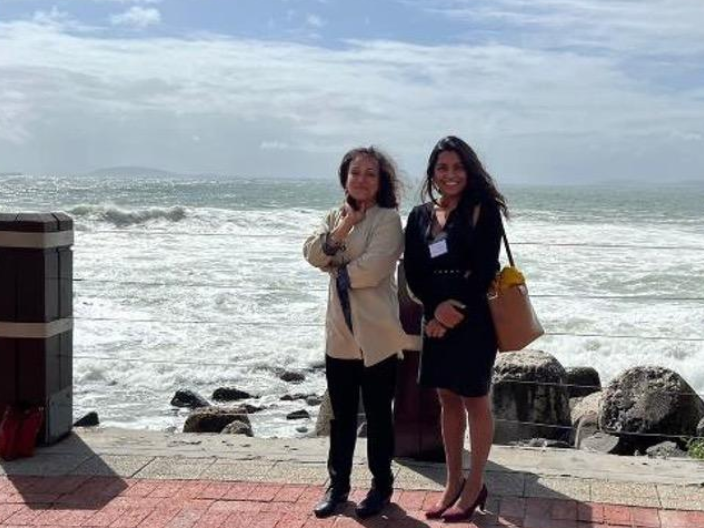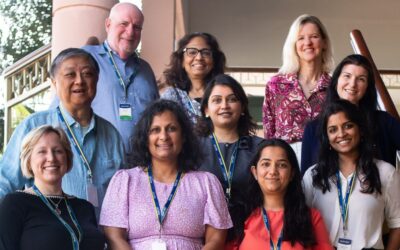Academic Advancement, Laboratory Leadership
Sudha Srinivasan: Dialogues on Academic Advancement, Laboratory Leadership, and Trailblazing Innovations in TB Healthcare
Sudha Srinivasan: Dialogues on Academic Advancement, Laboratory Leadership, and Trailblazing Innovations in TB Healthcare
This is a summary of a conversation with Dr. Sudha Srinivasan, former Program Officer at the TB Clinical Research Branch at the Division of AIDS at the National Institutes of Allergy and Infectious Diseases (NIAID) at the National Institutes of Health. In this role, Dr. Srinivasan was the Project Officer for RePORT International and played a key role in managing the evolution of RePORT International.
Dr. Srinivasan is a geneticist by training but now has had several decades of professional experience in managing international projects and programs in public health (both private and public sector). She recently left NIAID and is currently with the National Institute of Neurological Disorders and Stroke, as its Program Director for Global Health.
Could you provide a brief overview of the history and journey of RePORT? Please focus on how it became the collaborative consortium it is today.
The roots of RePORT trace back to a collaborative effort between the National Institutes of Health (NIH), U.S.A., Department of Biotechnology (DBT), India, and a group of researchers from various backgrounds, including pulmonary medicine, infectious diseases, and genetics. They came together to discuss the formation of what would later become RePORT India. A survey, featuring researchers from diverse disciplines such as pharmacokinetics, aging, and global health, marked the inception of the RePORT India network, which was couched under the U.S.-Indo Vaccine Action Program (VAP). Over the years, RePORT India has become a leading entity in TB/HIV research, with a focus on strengthening clinical and basic research in tuberculosis (TB) institutions. Over time, RePORT India expanded, incorporating expertise from Brazil and South Africa followed by other high disease burden country networks to create a truly international alliance.
How have the consortium’s goals and priorities evolved during your tenure as a sponsor?
As a sponsor representative, my tenure has been marked by a continuous evolution of RePORT’s goals and priorities. Adapting to the dynamic landscape of global health, we sought to address the research priorities that matter most and could best alleviate the disease burden. While TB may not be a prevalent issue in the U.S., our commitment to developing better interventions and strategies aligns with the global burden of disease, particularly in Sub-Saharan Africa, India, Brazil, and other countries. Our research priorities have remained synchronized with the overarching goal of mitigating the burden of disease worldwide.
What were the primary reasons you initially joined the consortium and what was the inception process of RePORT like?
Having previously been involved in research in HIV cohorts, the transition to TB was personally, a logical progression. Drawing from experience in the Multicenter AIDS cohort study and the Women’s Interagency HIV Study cohorts, HIV longitudinal cohorts supported by DAIDS, RePORT was structured as a TB/HIV cohort with similar frameworks, but mostly as bilateral initiatives and with joint funding from organizations such as Department of Biotechnology (DBT, India), South African Medical Research Council, and others. Challenges comprised of launching the consortium, navigating funding cycles, changing priorities and administrative agendas, and the unexpected disruption of COVID-19. These all tested our commitment and yet, the investment, energy, commitment, and heart put into this global initiative by principal investigators, U.S. collaborators, and other networks and sponsors has been unwavering and has resulted in the robust, productive TB/HIV research platform that RePORT is today.
Based on your experience, what advice would you give younger professionals who may be joining the consortium or similar initiatives?
For those embarking on similar journeys, especially in the realm of TB research, my advice is to stay rooted in the understanding that this field offers an opportunity to address the needs of the poorest of the poor. Encouraging junior investigators to consider a career in TB research is not just about science but also about making a tangible difference in global health. It is a chance to contribute to a field that addresses the neglected, and aids the most vulnerable populations, aligning personal passion with meaningful impact.
What role do you think relationship-building plays in the success of collaborative endeavors?
Relationship-building stands as a cornerstone of our success within the consortium. Understanding the scientific and personal goals of fellow institutions, acknowledging challenges, and embracing a nimble understanding of contextual restrictions have been paramount. The success of collaborative endeavors is intricately tied to the strength of relationships forged along the way.
How has your personal or professional growth been influenced by your role as a sponsor in the consortium?
My role as a sponsor has not only been a professional endeavor but a deeply personal one. The journey has been marked by incredible projects, personal investment, and a commitment similar to nurturing a newborn child. The perseverance of investigators, the commitment of program leads, and the enduring relationships forged have been instrumental in the success of our multifaceted and multinational effort. The lessons learned and skills gained in this journey are not just confined to TB research but are transferable, influencing personal and professional growth across various aspects of my career.
In conclusion, RePORT stands as a testament to the power of collaboration in addressing global health challenges. As we strive for sustainability, the hope is that this collaborative endeavor continues to bear fruit, making a lasting impact on the landscape of TB and HIV research worldwide.
What legacy or mark do you hope to leave behind within the consortium?
Looking ahead, the legacy I hope to leave within the consortium is one of making a difference, albeit in a small way, toward the promotion of TB and HIV research and the mitigation of the global burden of disease. The vision extends to sustainability, with a hope that the consortium, in collaboration with global partners, continues to flourish and make a lasting impact on a global scale.
Interviewed by Daphne Martin, Program Manager, TB RICC
Without Sudha Srinivasan’s passion and skills, the RePORT program would not have achieved its current stature, especially, if she had left RePORT five, even two years ago. The mark of a great leader/legacy is that the activities continue and excel after he/she moves on. RePORT will continue to excel, but we will miss the comfort of Sudha’s “having our backs” and working with us to overcome small and large obstacles. On a personal note, I appreciated Sudha’s “can-do: and up-beat attitude. RePORT will develop and prosper – but will be a little less fun… Thank you, Sudha and good luck!
What's new
International Annual Meeting 2025
international annual meeting 2025The registration is for scientific sessions only (September 18-19, 2025), but it also includes an option for a September 17th workshop (please look in the registration form for details) The Data Harmonization Session on September 17th...
Highlighting Rutgers Univ
Highlightening Rutgers UniversityAdvancing Global TB Research Through Leadership Rutgers University’s Contributions to RePORT InternationalAdvancing Global TB Research Through Leadership Rutgers University (RU) has a distinguished history in tuberculosis (TB) research...
Future Leaders Program
Future Leaders programMaking Way for the Next Generation of TB Research TrailblazersTaking charge of a TB research team, site, or lab not only requires scientific skills, but skills to direct and supervise effectively and develop one’s own research portfolio. RePORT...





